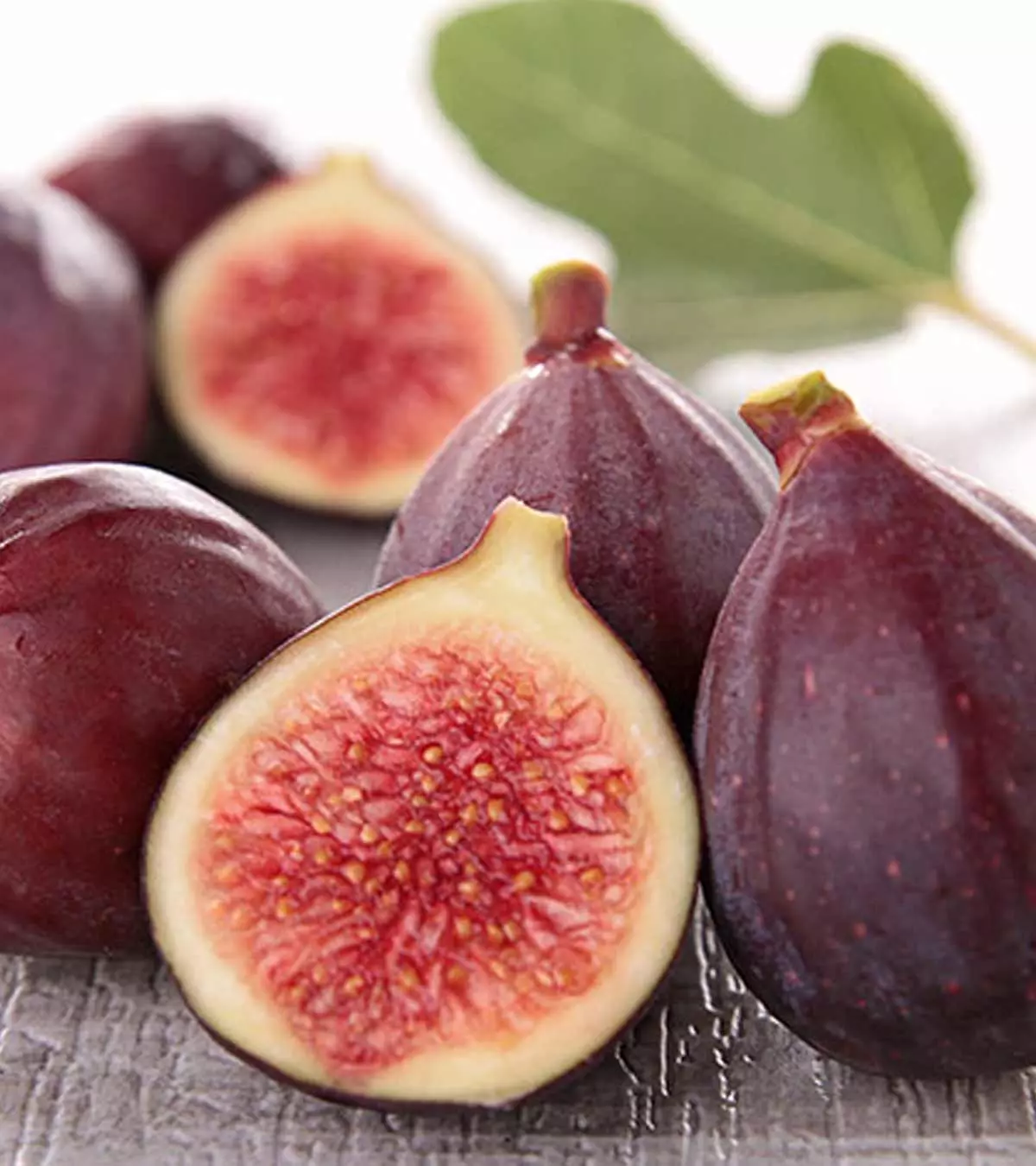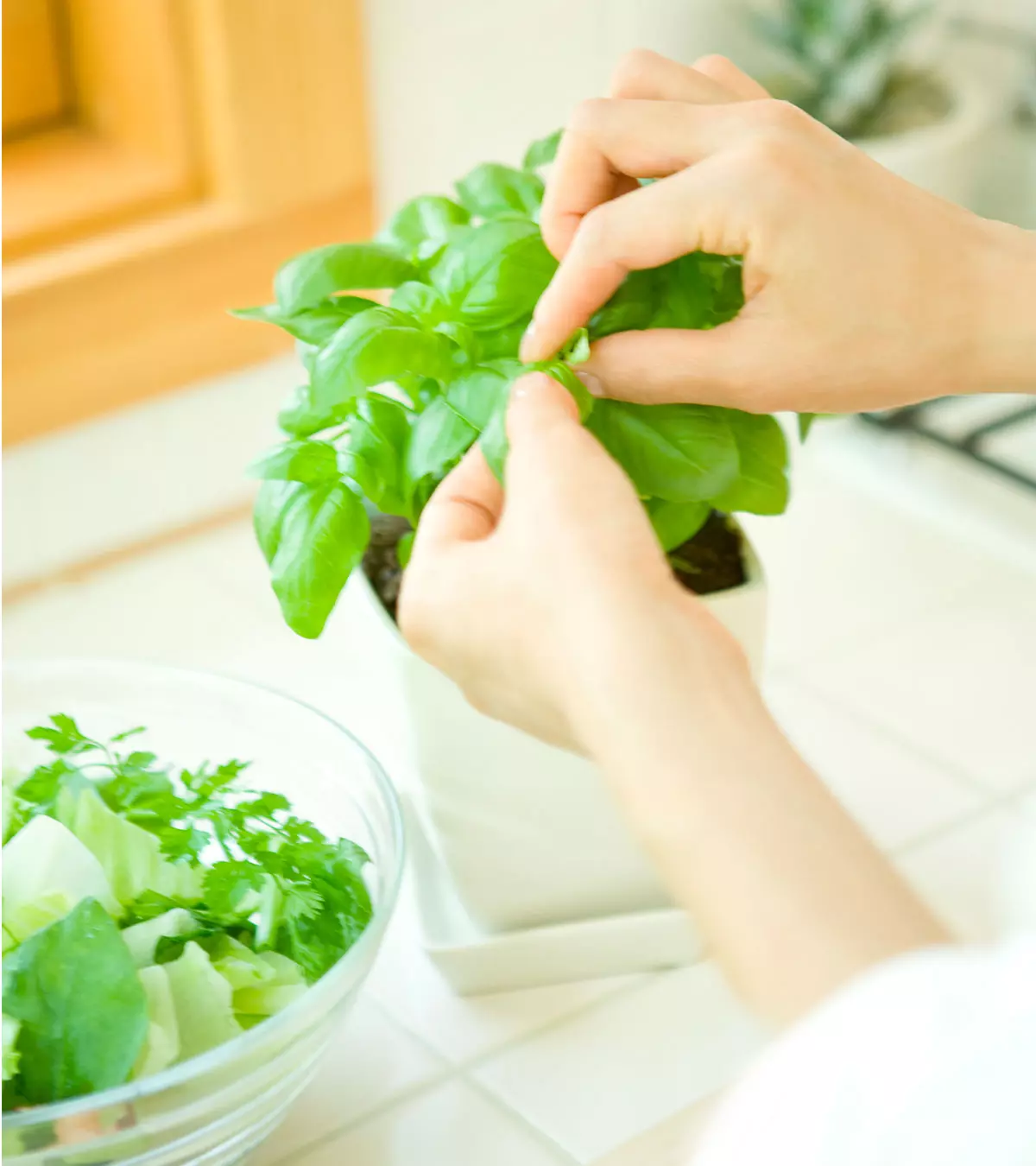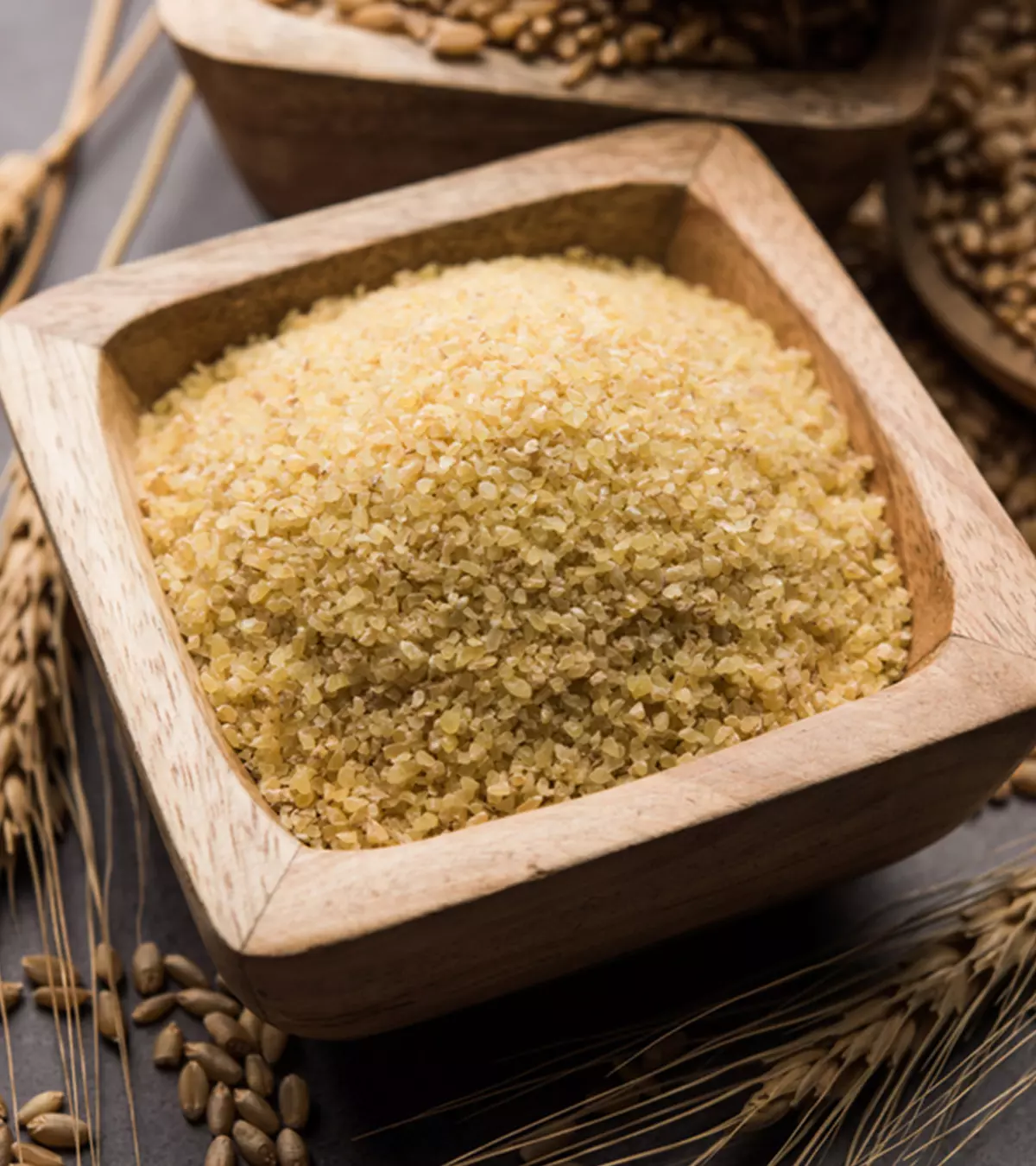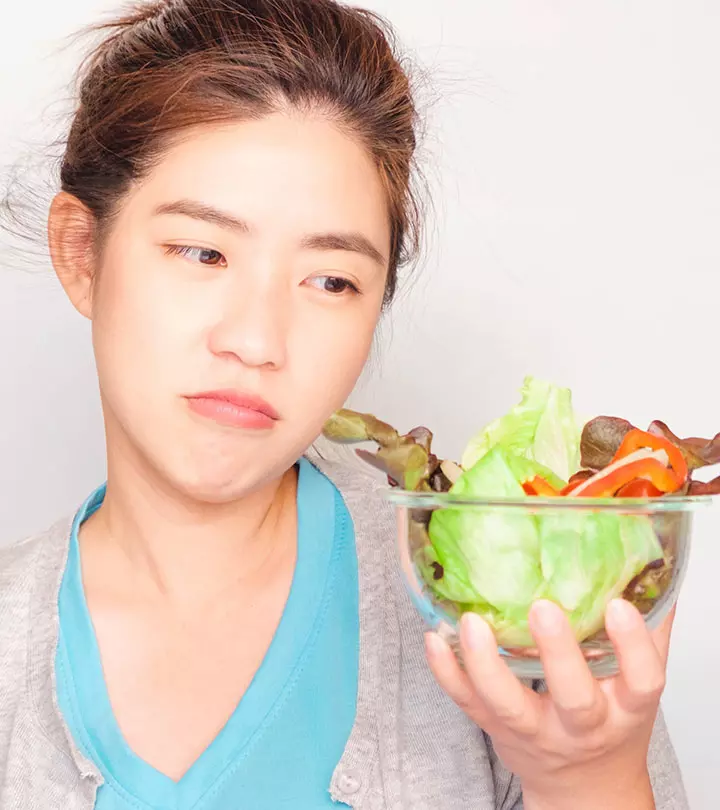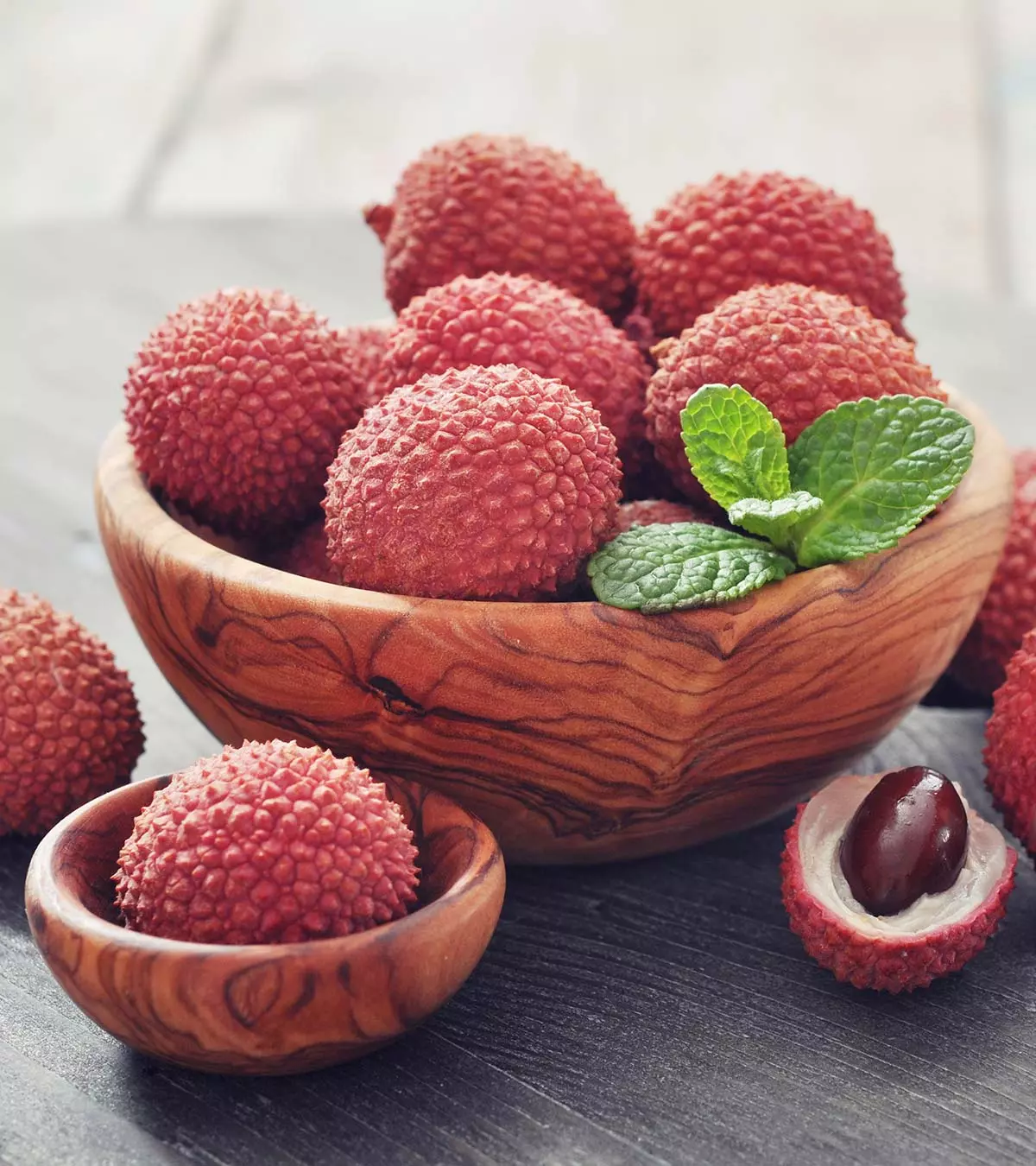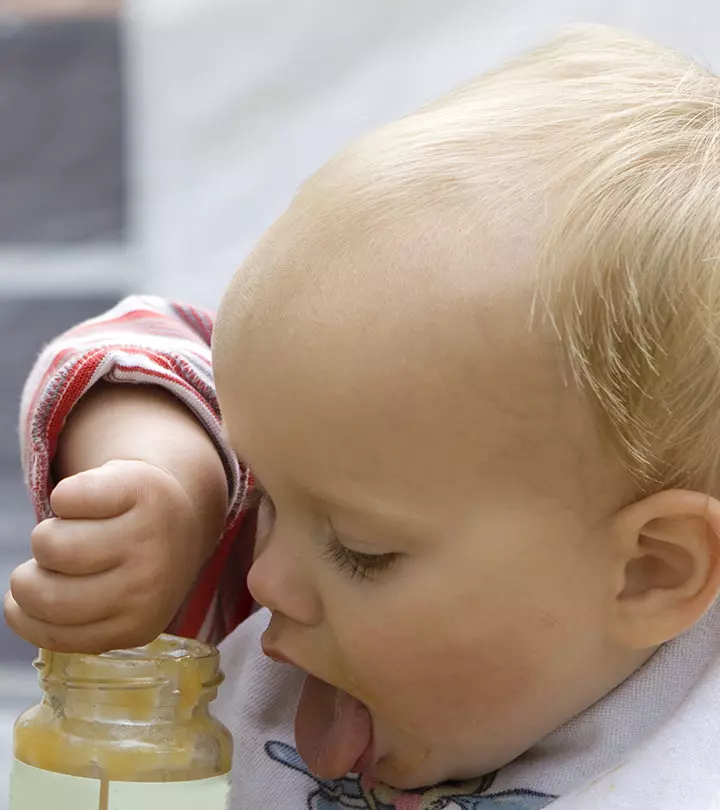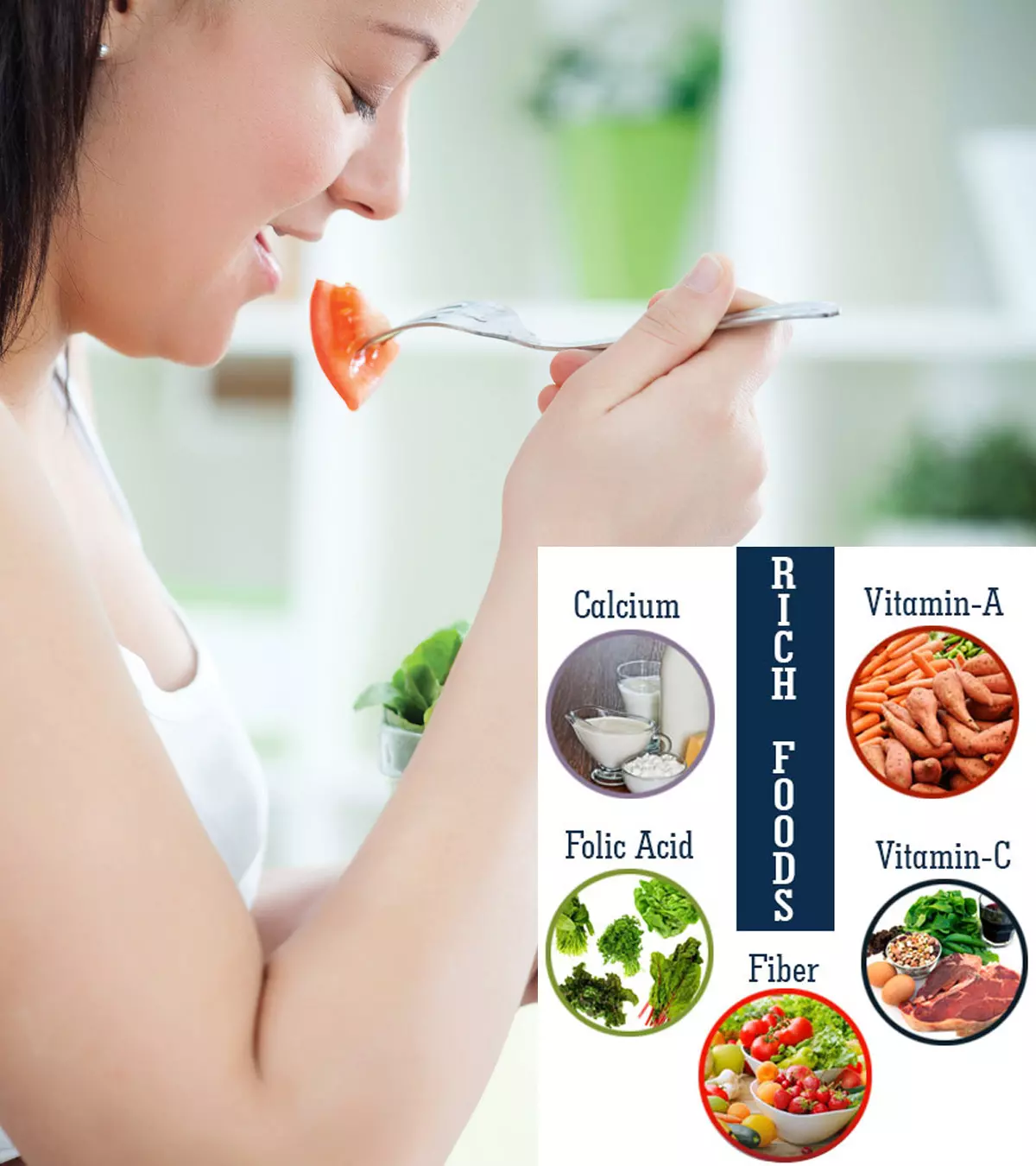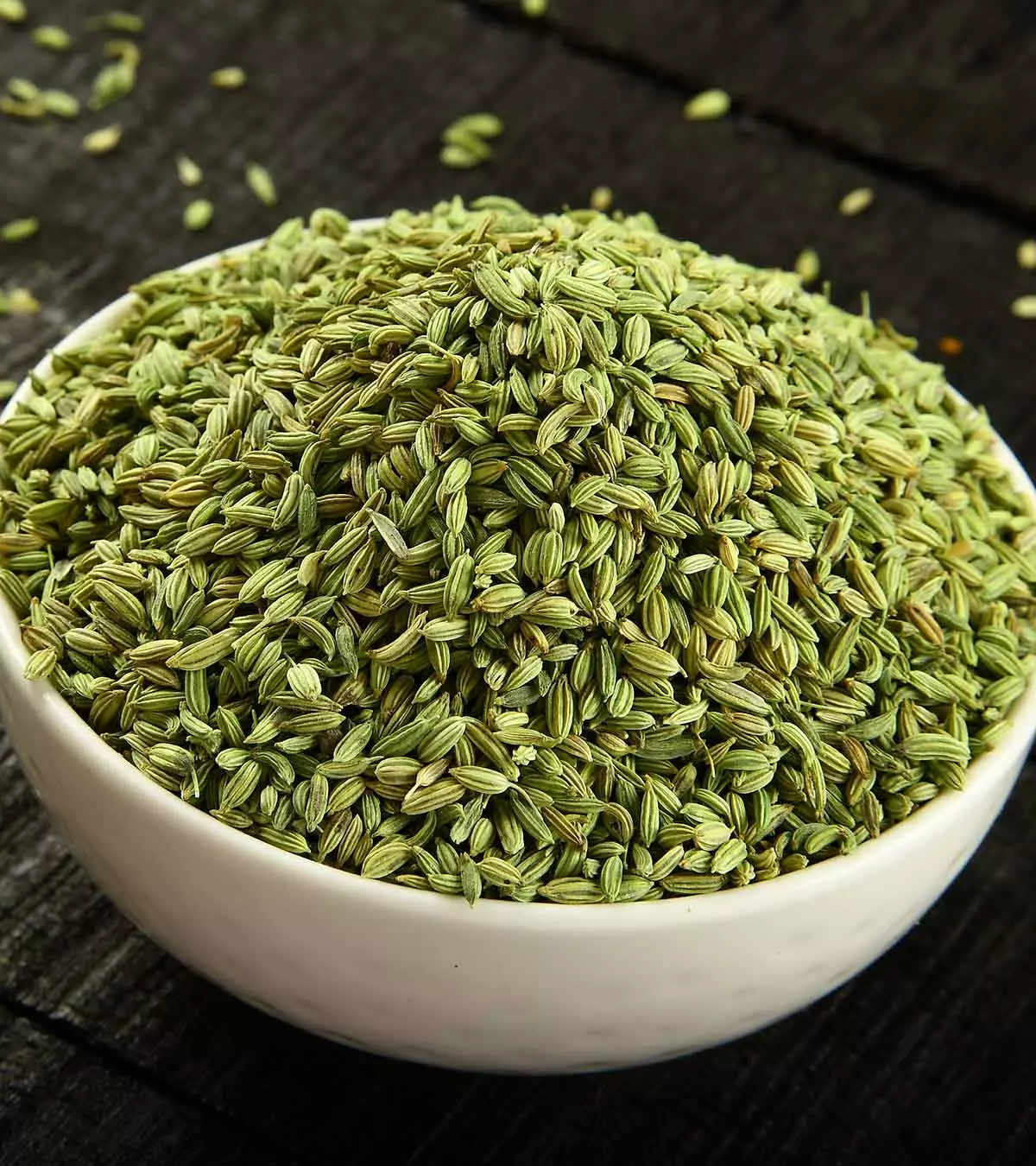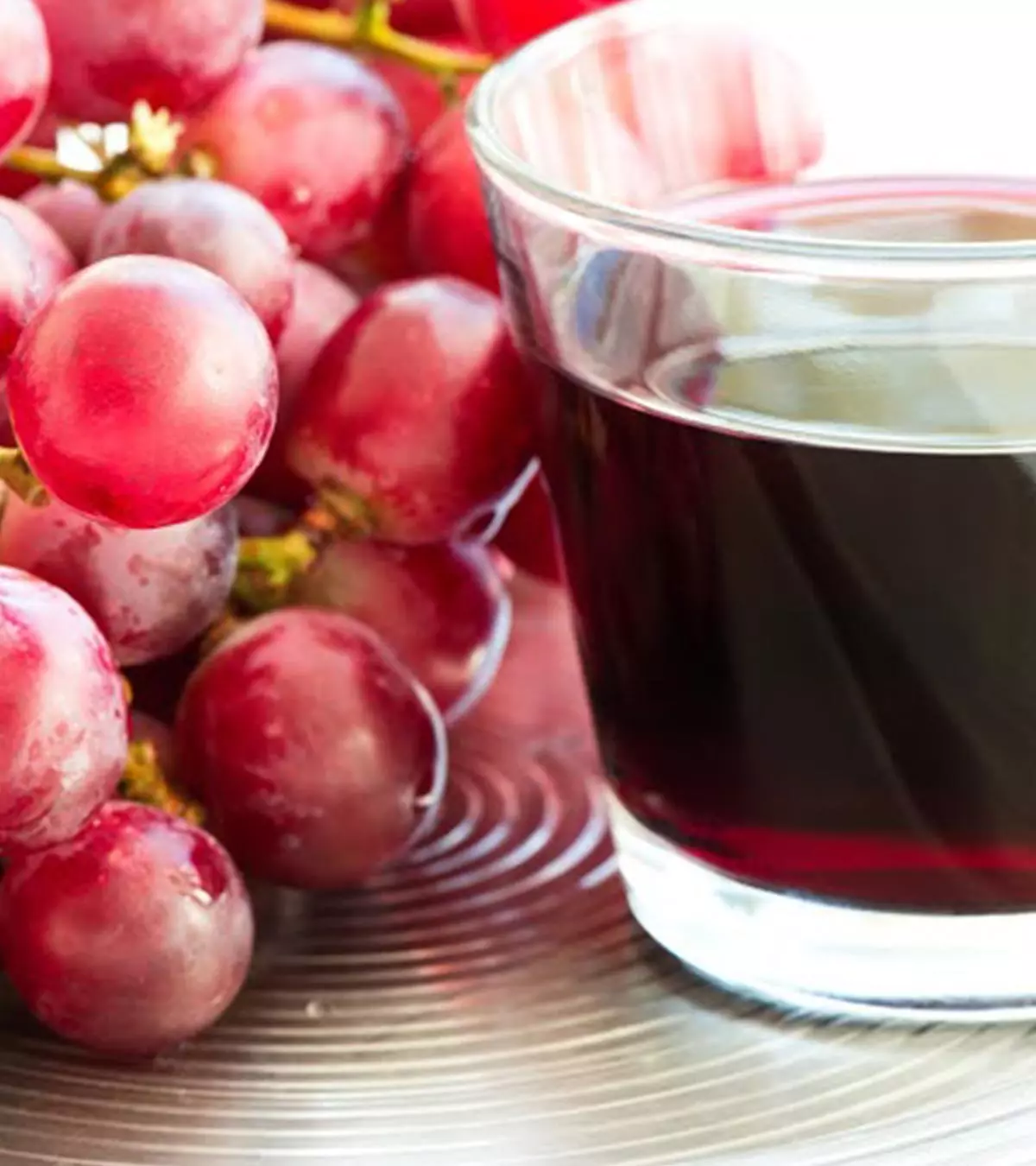
Image: Shutterstock
If you are a new parent who is looking for healthy drinks to include in your baby’s weaning diet routine, you may try grape juice for babies. With tons of suggestions and advice you receive regarding food and drinks for your baby, you may be perplexed about the right time and variety of juices to pick. Nevertheless, grapes’ antioxidant and vitamin-rich nature make them a great inclusion in your baby’s diet.

However, it is best to take a piece of medical advice and be well-informed about the safety aspects before planning to give grapes and grape juice to your baby. Browse through this post to learn about the age-appropriate food ways and precautions to take while feeding grape juice to your little one.
Key Pointers
- Including grapes in your baby’s diet can be beneficial due to their antioxidant and vitamin-rich nature.
- With the doctor’s consent, diluted grape juice can be given to babies over six months of age.
- Grape juice is naturally sweet and does not require the addition of sugar.
- Ensure that the juice is pasteurized and limit daily serving sizes to two to four ounces.
- Avoid giving grape juice to the baby right before bed.
The Right Time For Your Baby To Start Drinking Juice
Babies should be on a strict milk diet for the first six months of their life. Your baby’s diet can consist of breast milk and/or infant formula.
- After the first six months, you can introduce fruit and vegetable juices for babies. However, you need to take into account certain things:

- Ensure your baby can handle the change in his or her diet. The best way to ascertain this would be to consult your doctor before you try feeding juice to your baby.
- Once you start feeding juice, you need to make sure that you dilute it with either boiled or cooled water. The ideal water to juice ratio is 1:3.
- You need to understand that your baby’s diet should be dominated by milk in the first year of his or her development. Do make sure that in your zeal to feed your baby with juice, you do not cut down your baby’s milk intake or replace breastmilk or formula feeds with juice
- Also, make sure that the juice is served to your baby only at mealtimes and definitely not before your baby’s bedtime as this increases the risk for tooth decay.
 Point to consider
Point to considerIs It Good To Feed Grape Juice For Baby?
There is a lot of speculation about what juices are right for your baby. Grape juice is counted among the right fruits to boost your toddler’s nutrition.
- Grapes are, in general, given to babies as finger foods by many mothers. Babies can start to have small pieces of grapes once they can sit up by themselves and have a good pincer grasp. This is usually around 9 months of age. Grapes for babies need to be cut into quarters to prevent choking.
- Grape juice is a great way to introduce some amount of antioxidants and flavonoids into your baby’s diet.
- The best part about baby grape juice is that you do not need to add sugar to the juice to sweeten it. The sugar content of the fruit is sufficient to make it sweet and tasty.
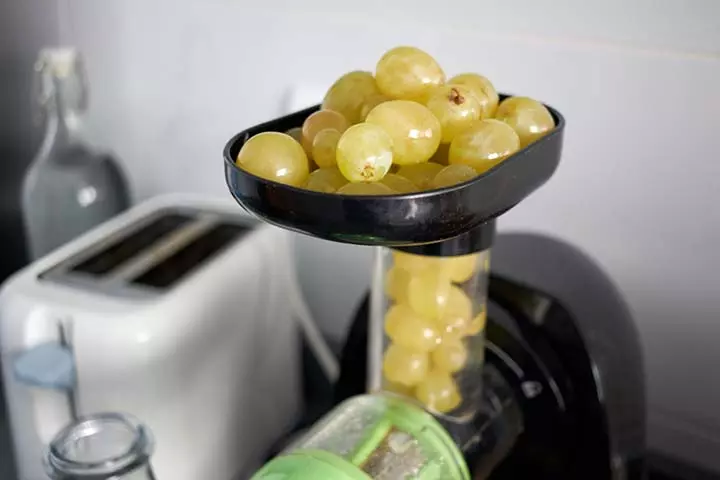
- Grapes are rich in vitamins as well, especially vitamin C. This makes this fruit a great food option for your baby.
- There are a lot of grape varieties available for you to choose from. Different colored grapes have different properties. However, Concord (bluish grapes), Catawba (red wine grapes), and Niagra (greenish-white grapes) are the most commonly available grape varieties in the US.
According to a North Carolina State University study, the Concord grape juice contains 86 to 135% anthocyanins compared to Concord grapes, which have only 14 to 39% anthocyanins. Anthocyanins are a water-soluble pigment that possess several health-promoting properties. - You can ask your doctor to recommend the right grape varieties for your baby.
 Quick tip
Quick tipPrecautions While Serving Grape Juice For Babies:
Now that you know that grape juice is actually good for your baby’s health, you need to know some of the precautions that are to be taken while feeding your baby with grape juice.
- Any juice needs to be served diluted. This rule stands for grape juice too.
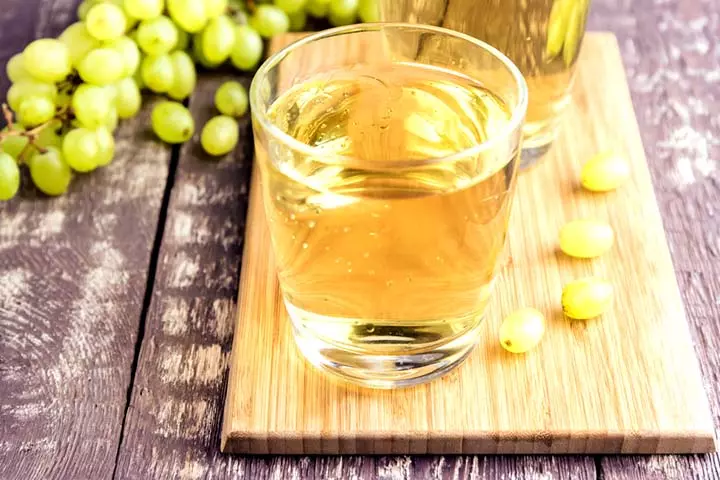
- Limit fruit juice intake to two to four ounces per day to help prevent tooth decay and obesity.
 Point to consider
Point to considerFrequently Asked Questions
1. Will grape juice help my baby poop?
All fruit juices, including grape juice, can help resolve constipation and enable the baby to have a smooth bowel movement, thus promoting a healthy baby digestive system (1).
2. Does grape juice increase weight?
Due to a lack of protein and fiber, excessive grape juice consumption may lead to weight gain (1).
3. At what age can I give my baby grapes?
Babies can start eating solid foods like ripe grapes as puree when they turn six months old (4). Still, it would be prudent to wait until they reach the appropriate month. This is because grapes have a higher choking risk. Before feeding grapes, deseed, peel, and mash the flesh into a pulp. Follow a three-day rule to check for any baby allergies to grapes. If they show symptoms such as shortness of breath, stomach pain, and itchy rashes, don’t feed and consult a doctor.
4. Can grape juice cause gas in my baby?
Fruits and juices high in sorbitol cause gas in babies (5). But white grape juice has no sorbitol. So, it is easier for them to digest than apple or pear juice. Sorbitol is indigestible and can disrupt baby digestion or the gastrointestinal tracts of babies, leading to gas and diarrhea (6). So, it is okay to feed them white grape juice without worrying about them feeling discomfort.
5. Which juice is good for treating constipation in babies?
Apple, pear, and grape juice are ideal for treating digestive discomforts like constipation in babies at home (7). Try giving 100% fruit juice of pear, cherry, apple, or prune once a day if they are not eating baby food. Stop the juice when their stools become visibly loose. If your baby has begun eating food, give them high-fiber fruits and vegetables in puréed form (8).
You can introduce grape juice into your baby’s diet after the six-month mark. However, check with your child’s doctor to know if it is right to feed your baby with grape juice.
Infographic: Benefits Of Grape Juice For Babies
Grapes are nutrient-rich fruits that come in various colors and flavors. Grape juice is a good snack option for babies and can be introduced after the baby is six months old. Scroll through the infographic below to discover why it is a quick and convenient way to feed your baby.
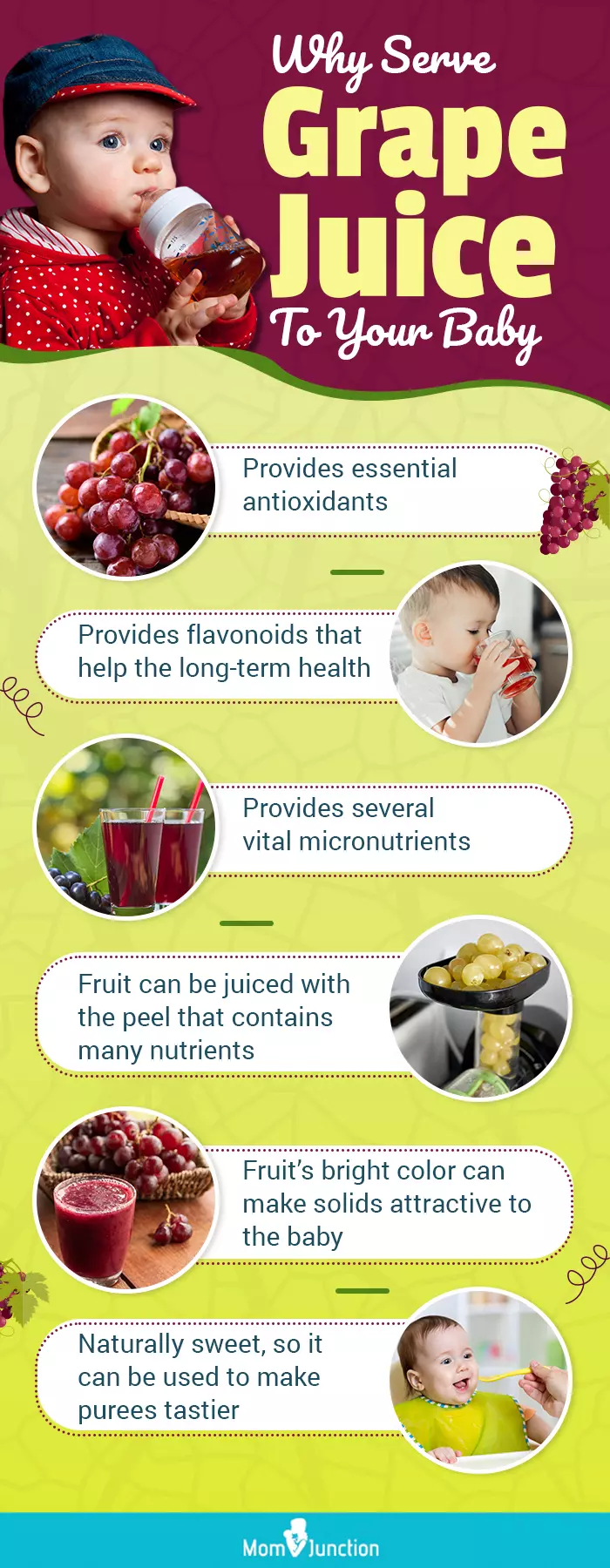
Illustration: Momjunction Design Team
Illustration: Is It Good To Feed Your Baby Grape Juice?
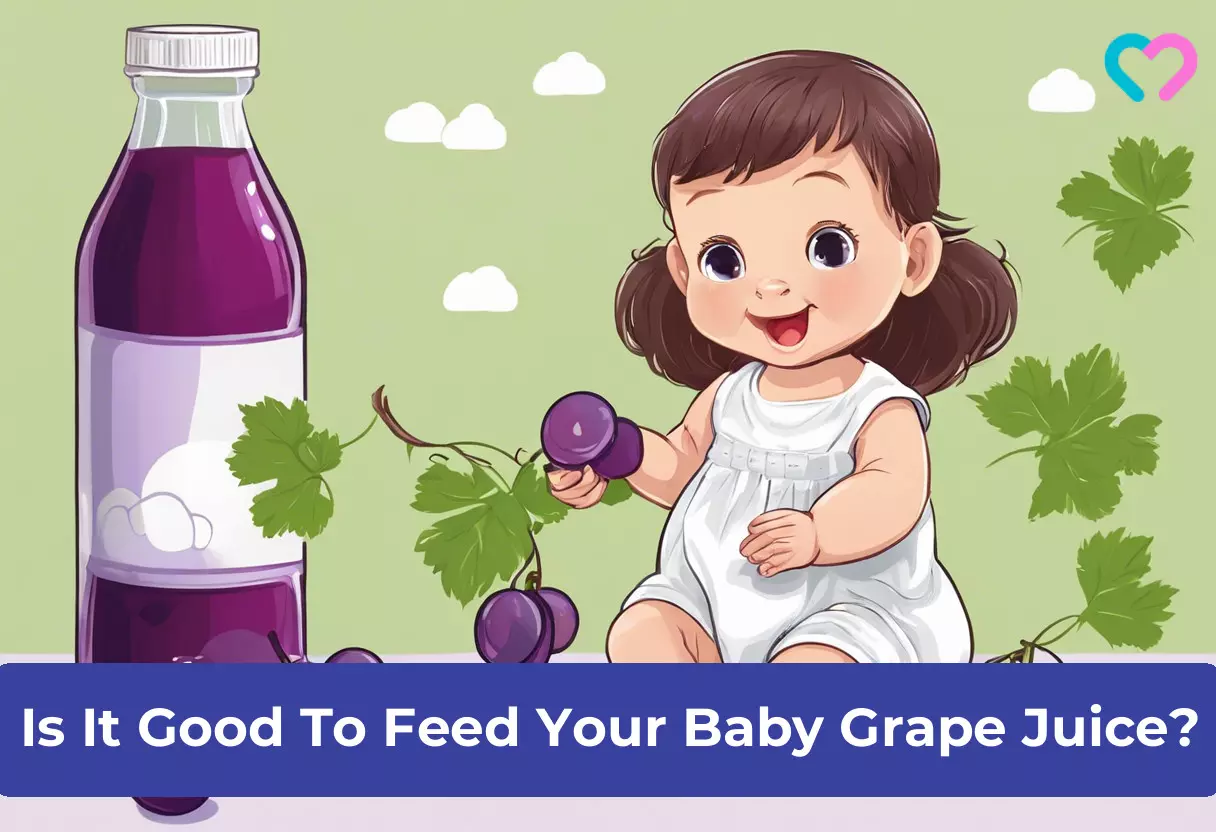
Image: Stable Diffusion/MomJunction Design Team
References
- Fruit Juice in Infants Children and Adolescents: Current Recommendations
https://publications.aap.org/pediatrics/article/139/6/e20170967/38754/Fruit-Juice-in-Infants-Children-and-Adolescents?autologincheck=redirected - Where We Stand: Fruit Juice for Children.
https://www.fda.gov/food/buy-store-serve-safe-food/what-you-need-know-about-juice-safety - What You Need to Know About Juice Safety.
https://www.eatright.org/food/home-food-safety - When, What, and How to Introduce Solid Foods
https://www.cdc.gov/infant-toddler-nutrition/foods-and-drinks/when-what-and-how-to-introduce-solid-foods.html?CDC_AAref_Val=https://www.cdc.gov/nutrition/infantandtoddlernutrition/foods-and-drinks/when-to-introduce-solid-foods.html - Sorbitol intolerance: an unappreciated cause of functional gastrointestinal complaints
https://pubmed.ncbi.nlm.nih.gov/6847853/#:~:text=In%20a%20majority%20of%20subjects - Consequences of incomplete carbohydrate absorption from fruit juice consumption in infants
https://pubmed.ncbi.nlm.nih.gov/10520620/ - How can I tell if my baby is constipated.
https://www.healthychildren.org/English/ages-stages/baby/diapers-clothing/Pages/Infant-Constipation.aspx - Constipation: Infant
https://www.nationwidechildrens.org/conditions/constipation-infant
Community Experiences
Join the conversation and become a part of our nurturing community! Share your stories, experiences, and insights to connect with fellow parents.
Read full bio of Dr. Jessica Madden
Read full bio of Jessica Albert
Read full bio of Swati Patwal
Read full bio of Vidya Tadapatri







